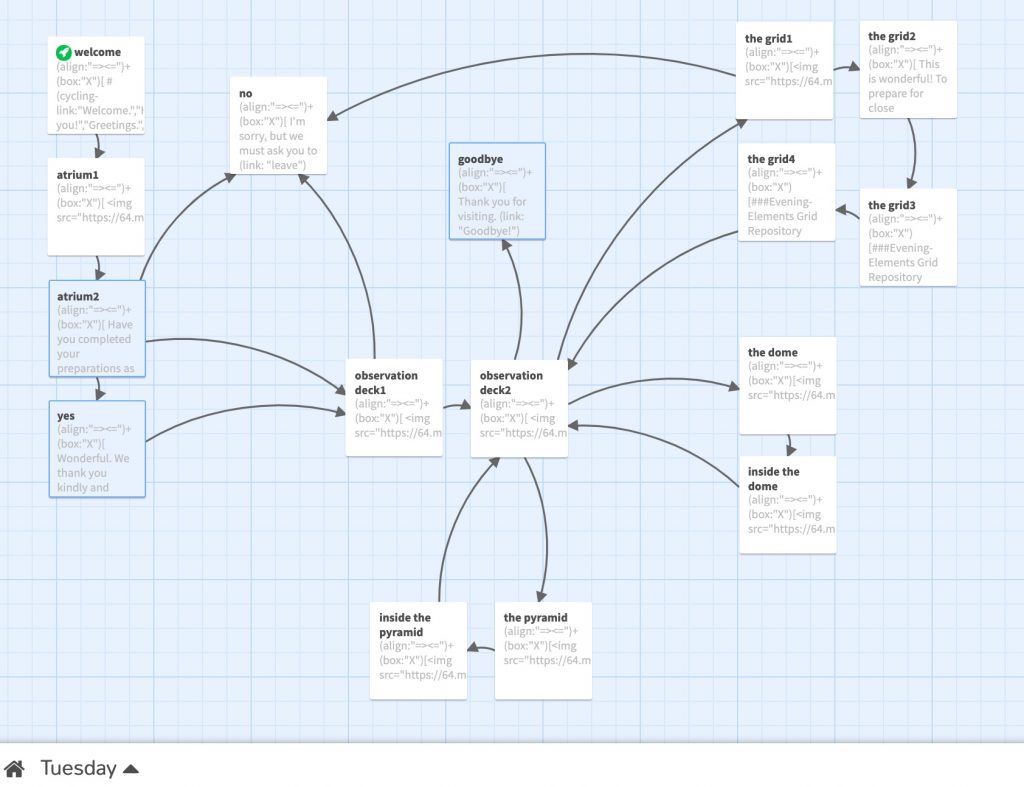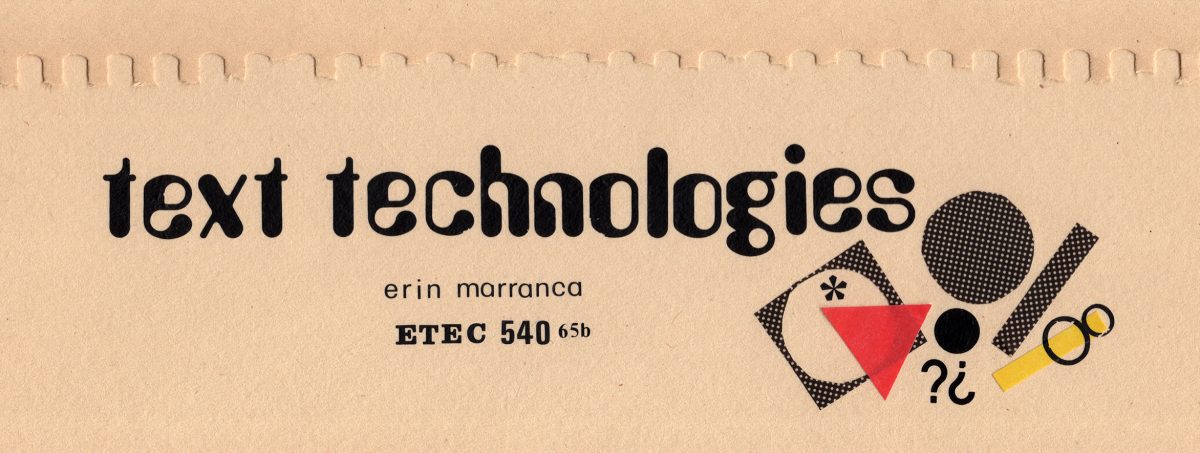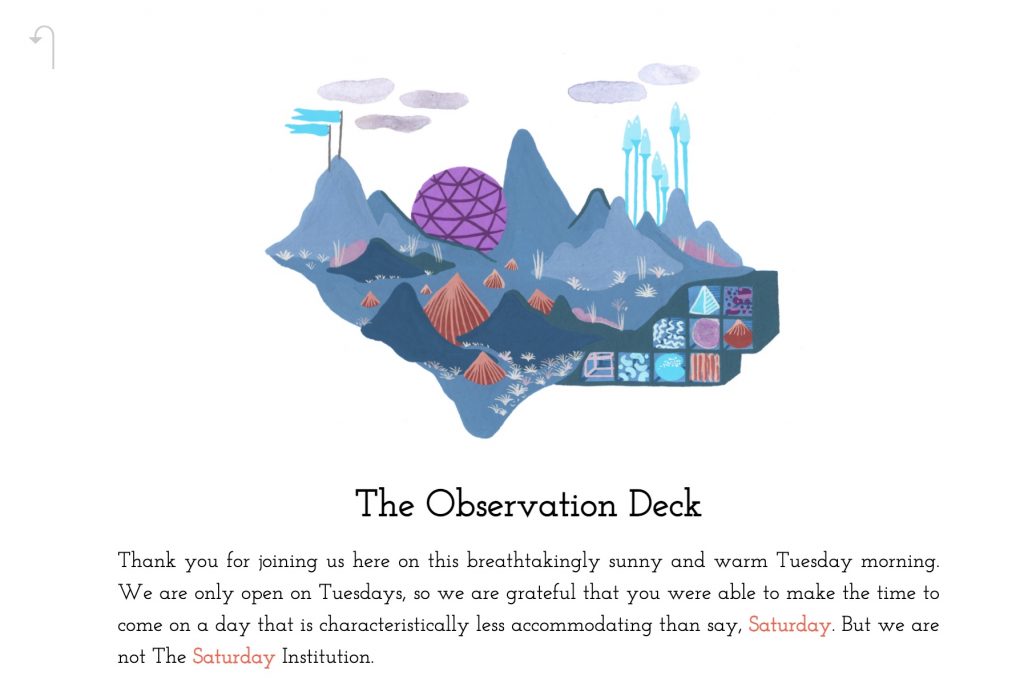
➔Play/explore/experience: Tuesday the Game
This week’s readings, particularly Bolter’s (2001) text, got me thinking about the form, function and my own relationship to the concept of the encyclopedia. In hindsight the idea of containing all knowledge in one set of books, seems both romantic and naïve, but of course I understand that many of our past record-keeping/knowledge archiving methods are archaic (literally and figuratively) when compared against the infinite capabilities offered by the internet. Bolter covers the different historical approaches to encyclopedic design, including a trend away “from hierarchical to alphabetical organization” (p. 85) as, “unlike topical outlines did not presuppose a shared body of knowledge or worldview amongst the readers” (p.85). Considering this shift in form, I can’t help but think that although I appreciate a format that attempts to diminish inherent bias, relying on alphabetization and indexing reduces opportunities for explorative or recreational reading, and relegates the encyclopedia to a reference tool.
One of my favourite art themes is the practice of taking an expected, familiar or quotidian structure, and using it in a new, unexpected way. For example, the practice or philosophy of ‘Pataphysics, which playfully explores this concept and takes it to a level that is purposefully and perhaps irritatingly confounding and absurd. Reading about the history of encyclopedias brought to mind other creative examples; firstly, Jorge Luis Borges’ short story Tlön, Uqbar, Orbis Tertius, written in 1947, where he describes an encyclopedia set from a mythical place called Tlön located in the ambiguous region on Uqbar. I am enamored by the way he describes the language of Tlön:
There are no nouns in Tlön conjectural Ursprache, from which the “present” languages and the dialectics are derived: there are impersonal verbs, modified by monosyllabic suffixes (or prefixes) with an adverbial value. For example: there is no word corresponding to the word “moon,” but there is a word which in English would be “to moon” or “to moonate.” “The moon rose above the river” is hlör u fang axaxaxas mlö, or literally: “up-ward behind the onstreaming it mooned” (Borges, 2010, pp. 24-25).
A second example, that was conceivably inspired by Borges’ strange land is the Italian illustrator, Luigi Serafini’s elusive masterpiece, The Codex Serafinianus. This large book presents as a beautifully illustrated and colourful encyclopedia of bizarre imagery and an entirely concocted written language.
Inspired by these ridiculous, yet completely charming encyclopedic works of art, (not to mention the novel In Watermelon Sugar by Richard Brautigan and my experience visiting The Getty Research Institute for the first time) I created a Twine narrative that proposes to guide the participant in an exploration of an extraordinary and imaginary new world. My aim was to stay away from the hierarchal form of the encyclopedia, or standard webpage, and to play with Bolter’s (2001) notion that hypertext provides a spatiality or a “topography” (p. 36) to language. He writes, “Electronic writing can be both a visual and verbal description. It is not the writing of a place, but rather a writing with places as spatially realized topics” (p. 36). Rather than creating a website that communicates about a place, my intent was to create the place itself within the online realm.
Reference List:
Bolter, J.D. (2001). Writing Space: Computers, hypertext, and the remediation of print. Mahway, NJ: Lawrence Erlbaum Associates.
Borges, J. L. (2010). Tlön, Uqbar, Orbis Tertius. In Everything and Nothing (pp. 17-38). New York: New Directions.


Hi Erin! I loved visiting your beautiful exhibition! The experience did feel truly spatial. I’m in love with your art!
Aw! Thanks Olga! I definitely went overboard on the idea. I thought I could get it done quickly, but I didn’t account for the learning curve of Twine and it ended up being like… two solid days of work. It would be so fun to build a whole complex world with sounds, more illustrations and effects!
I would be interested to visit this Twine world of yours, should you ever decide to take this idea further!